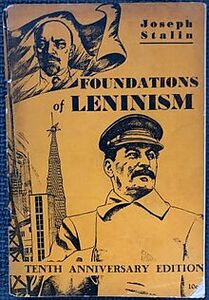Template:Main Page/Featured
Jump to navigation
Jump to search
|
Marxism–Leninism is a communist tendency developed by Joseph Stalin as a continuation of Leninist theory. Its creation came about during a period when competing factions within the Soviet leadership attempted to establish their legitimacy as Lenin's political successors following his death. Soviet leaders such as Leon Trotsky, Grigory Zinoviev, and Joseph Stalin wrote works developing the concept of a specifically Leninist ideology. Stalin coined the term to describe an ideology which considers Lenin's political thought to be a necessary development of Marxism, and made the term popular through his 1938 work The History of the Communist Party of the Soviet Union (Bolsheviks). It was the official ideology of the Soviet Union and other socialist states. After the success of the Russian revolution in 1917 and the establishment of the Soviet Union in 1922, many communist parties around the world began to adopt Marxism–Leninism as their political line, and Marxism–Leninism was the main theoretical framework which guided multiple proletarian revolutions across the globe during the 20th century. Marxism–Leninism continues to be followed by a large portion of the international workers' movement, and is upheld by many communist parties to this day. |
